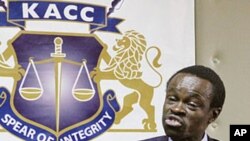Kenya's anti-corruption czar began his tenure amidst high hopes he would break Kenya's endemic culture of graft. But just over one year later, PLO Lumumba is set to leave office with little accomplished while new laws threaten to cripple the fight against corruption.
A toothless watchdog
In July of last year, Patrick Loch Otieno Lumumba, popularly known as PLO took up office as the director of the Kenya Anti-Corruption Commission. Then a well known lawyer and television personality, he was seen by many at the time as an energetic pick for the anti-graft body, which had been criticized as a toothless watchdog.
Lumumba himself embraced the challenge, promising a new day in notoriously corrupt Kenya. “You cannot run a country whose creed is greed. And the duty of those of us who have been given the honor and privilege to be the arrow’s head in the fight against corruption is to change that creed,” he said.
During the first half of his tenure, it appeared as though Lumumba would deliver on many of his grand promises. In early 2011, some of Kenya’s major politicians found themselves facing serious charges of corruption and graft.
Allegations of irregularities
Foreign Minister Moses Wetang’ula was forced to resign his post after the KACC launched investigations into alleged irregularities in land deals linked to Kenya’s foreign embassies.
Industrialization Minister and Orange Democratic Movement party chief Henry Kosgey stepped down after being linked to illegal imports at Kenya’s port. And, powerful Rift Valley politician and presidential hopeful William Ruto was also forced to resign his cabinet post after being charged with benefiting from the illegal sale of government land.
But for all the theatrics and cases launched by the KACC, none of the major investigations over the past year have amounted to any significant convictions. All of the politicians placed under Lumumba’s axe have since returned to government.
Now, recent allegations made by Lumumba have provoked a backlash in Kenya’s parliament.
Bribery investigations
The KACC Director accused Kenyan Member of Parliament Cecily Mbarire of attempting to bribe him with a check for just over $1,000. Mbarire has hit back, saying the money was requested by Lumumba himself as a donation to the director’s charitable foundation. Mbarire has further filed a lawsuit in Kenya’s courts, seeking damages for defamation.
The confrontation has provoked the wrath of Kenya’s parliament. In a recent debate, members of the body such as Water and Irrigation Minister Charity Ngilu accused Lumumba of using his office to engage in political attacks. “The kind of a person that we got last year, hoping that he was going to be the right person, really was a big mistake,” Ngilu stated.
Many of the members who spoke out against Lumumba - including Ngilu - have been connected to KACC investigations.
Despite the significant criticism being heaped on the anti-corruption chief, Lumumba is not without supporters. Notably, Vice President Kalonzo Musyoka stood up to hit back at those attacking his record. The Vice President said Kenya’s Lawmakers were threatened by Lumumba’s “bold” fight against official corruption.
Anti-corruption, bill threatened
But the recent debates in Kenya’s parliament threaten more than Lumumba’s job. This week, lawmakers passed the Ethics and Anti-Corruption Bill in order to transition the KACC into the framework envisioned by the new constitution.
On Friday, a coalition of Kenyans NGO’s gathered Thursday to warn against enacting the bill. The Chairman of the National Council of NGOs, Ken Wafula, said the bill’s passage was a personal attack on PLO Lumumba.
“In the end, Parliament legislated against the Directorate of KACC and not corruption. There was a unity of purpose rarely seen in the House in passing some amendments which in our view will greatly undermine the fight against corruption,” Wafula noted.
The bill calls for Lumumba’s immediate dismissal, leaving the post vacant until a new director is appointed through a political process which could potentially take months. During the debate, the parliament rejected granting the agency prosecutorial powers, an obstacle which observers say has often restricted the KACC.
The coalition of NGOs also took issue with an amendment to remove the power of the graft body to regulate foreign bank accounts of public servants. The new constitution forbids public officials from holding foreign accounts, but Wafula said without oversight, the graft body cannot ensure that public officers are not engaging in graft.
It appears as though the recent actions of Lumumba have prompted Parliament to curtail the powers anti-corruption officials in Kenya. But members of the coalition refused to blame the Bills shortcomings on KACC Director Lumumba.
The Ethics and Anti-Corruption Bill needs President Mwai Kibaki’s final signature before it becomes law. Kenya’s NGOs have on the president to send the bill back in order to enact changes that give Kenya’s future anti-corruption body a fair chance at fighting the country’s corruption.












